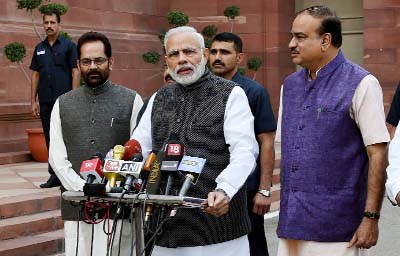
Reuters, Mumbai :
The Indian rupee fell to a record low of 68.8650 on Thursday, pressured by a rallying US dollar, capital outflows from emerging markets, and worries about the country’s demonetisation drive.
Despite repeated interventions by the central bank to slow the slide, the rupee breached its previous low of 68.85 to the dollar hit in August 2013, when India was mired in its worst currency crisis in more than two decades.
The Reserve Bank of India intervened again in the afternoon, after spending around $500 million in the morning, eventually pushing the rupee to a close of 68.73, down from its 68.58 close on Wednesday.
A government spokesman attributed the rupee’s falls to the recent slide in emerging market currencies, which has also seen the yuan hit 8-1/2 year lows.
The rupee has fallen around 3 per cent this month, its biggest fall against the dollar since August 2015, though it has fared better than many other emerging market currencies since Donald Trump’s shock win in the US presidential election.
Meanwhile, Indian Prime Minister Narendra Modi hit back Friday at the mounting criticism of his decision to withdraw all high-denomination bank notes from circulation, describing the move as “for the larger social good”.
The November 8 move to ban the 500 and 1,000 rupees ($7.30, $14.60) notes-some 85 percent of all bills in circulation-as legal tender has sparked turmoil in the vast cash-reliant nation.
Long queues have formed outside banks across the country as people try to get rid of their old notes, and the government has repeatedly changed rules surrounding the exchange process in response to pressure from various groups and mounting chaos.
“The decision isn’t being criticised much (by the common man),” Modi said in a speech Friday, in which he praised citizens as “soldiers in this fight against corruption and black (unaccounted) money”.
“Some things have to be done above politics for the larger social good,” he added.
Critics of the move have included former prime minister Manmohan Singh-whose economic reforms are credited with rescuing India from the brink of bankruptcy in the early 1990s-who said that the decision could shave two percentage points from the country’s GDP.
Ratings agency Fitch has also said it would revise down India growth forecasts for the fourth quarter of 2016 after the shock move.
Others have slammed the government for its “shoddy implementation” of the scheme.
But Modi hit out at his rivals, saying those criticising his decision were doing so because they were “sad that they didn’t get any notice, a chance to prepare for the decision”.
The Indian rupee fell to a record low of 68.8650 on Thursday, pressured by a rallying US dollar, capital outflows from emerging markets, and worries about the country’s demonetisation drive.
Despite repeated interventions by the central bank to slow the slide, the rupee breached its previous low of 68.85 to the dollar hit in August 2013, when India was mired in its worst currency crisis in more than two decades.
The Reserve Bank of India intervened again in the afternoon, after spending around $500 million in the morning, eventually pushing the rupee to a close of 68.73, down from its 68.58 close on Wednesday.
A government spokesman attributed the rupee’s falls to the recent slide in emerging market currencies, which has also seen the yuan hit 8-1/2 year lows.
The rupee has fallen around 3 per cent this month, its biggest fall against the dollar since August 2015, though it has fared better than many other emerging market currencies since Donald Trump’s shock win in the US presidential election.
Meanwhile, Indian Prime Minister Narendra Modi hit back Friday at the mounting criticism of his decision to withdraw all high-denomination bank notes from circulation, describing the move as “for the larger social good”.
The November 8 move to ban the 500 and 1,000 rupees ($7.30, $14.60) notes-some 85 percent of all bills in circulation-as legal tender has sparked turmoil in the vast cash-reliant nation.
Long queues have formed outside banks across the country as people try to get rid of their old notes, and the government has repeatedly changed rules surrounding the exchange process in response to pressure from various groups and mounting chaos.
“The decision isn’t being criticised much (by the common man),” Modi said in a speech Friday, in which he praised citizens as “soldiers in this fight against corruption and black (unaccounted) money”.
“Some things have to be done above politics for the larger social good,” he added.
Critics of the move have included former prime minister Manmohan Singh-whose economic reforms are credited with rescuing India from the brink of bankruptcy in the early 1990s-who said that the decision could shave two percentage points from the country’s GDP.
Ratings agency Fitch has also said it would revise down India growth forecasts for the fourth quarter of 2016 after the shock move.
Others have slammed the government for its “shoddy implementation” of the scheme.
But Modi hit out at his rivals, saying those criticising his decision were doing so because they were “sad that they didn’t get any notice, a chance to prepare for the decision”.

